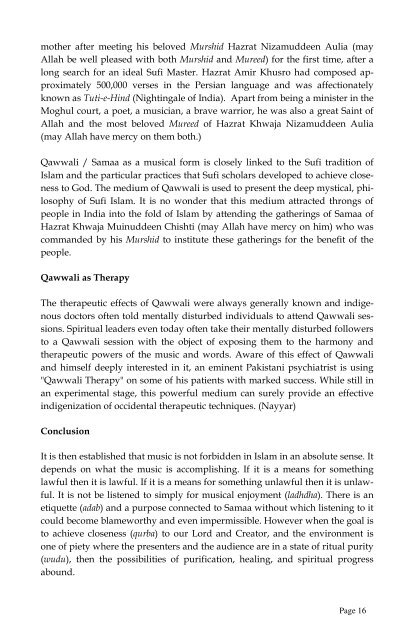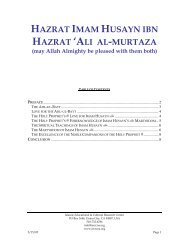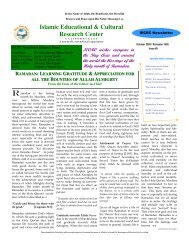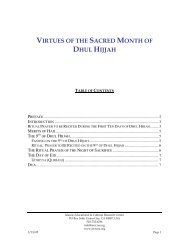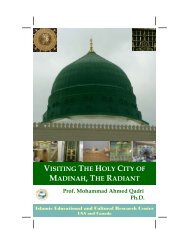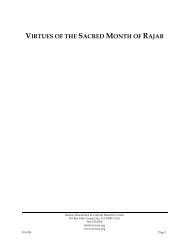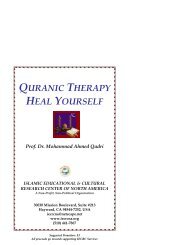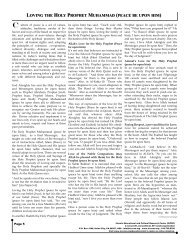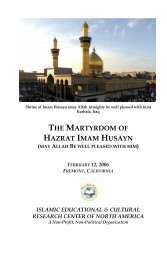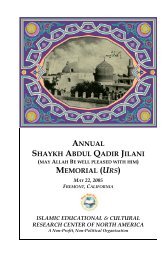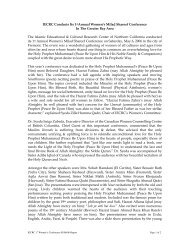Khwaja Ghareeb Nawaz rahmatullah alayh - IECRC
Khwaja Ghareeb Nawaz rahmatullah alayh - IECRC
Khwaja Ghareeb Nawaz rahmatullah alayh - IECRC
You also want an ePaper? Increase the reach of your titles
YUMPU automatically turns print PDFs into web optimized ePapers that Google loves.
mother after meeting his beloved Murshid Hazrat Nizamuddeen Aulia (may<br />
Allah be well pleased with both Murshid and Mureed) for the first time, after a<br />
long search for an ideal Sufi Master. Hazrat Amir Khusro had composed approximately<br />
500,000 verses in the Persian language and was affectionately<br />
known as Tuti-e-Hind (Nightingale of India). Apart from being a minister in the<br />
Moghul court, a poet, a musician, a brave warrior, he was also a great Saint of<br />
Allah and the most beloved Mureed of Hazrat <strong>Khwaja</strong> Nizamuddeen Aulia<br />
(may Allah have mercy on them both.)<br />
Qawwali / Samaa as a musical form is closely linked to the Sufi tradition of<br />
Islam and the particular practices that Sufi scholars developed to achieve closeness<br />
to God. The medium of Qawwali is used to present the deep mystical, philosophy<br />
of Sufi Islam. It is no wonder that this medium attracted throngs of<br />
people in India into the fold of Islam by attending the gatherings of Samaa of<br />
Hazrat <strong>Khwaja</strong> Muinuddeen Chishti (may Allah have mercy on him) who was<br />
commanded by his Murshid to institute these gatherings for the benefit of the<br />
people.<br />
Qawwali as Therapy<br />
The therapeutic effects of Qawwali were always generally known and indigenous<br />
doctors often told mentally disturbed individuals to attend Qawwali sessions.<br />
Spiritual leaders even today often take their mentally disturbed followers<br />
to a Qawwali session with the object of exposing them to the harmony and<br />
therapeutic powers of the music and words. Aware of this effect of Qawwali<br />
and himself deeply interested in it, an eminent Pakistani psychiatrist is using<br />
"Qawwali Therapy" on some of his patients with marked success. While still in<br />
an experimental stage, this powerful medium can surely provide an effective<br />
indigenization of occidental therapeutic techniques. (Nayyar)<br />
Conclusion<br />
It is then established that music is not forbidden in Islam in an absolute sense. It<br />
depends on what the music is accomplishing. If it is a means for something<br />
lawful then it is lawful. If it is a means for something unlawful then it is unlawful.<br />
It is not be listened to simply for musical enjoyment (ladhdha). There is an<br />
etiquette (adab) and a purpose connected to Samaa without which listening to it<br />
could become blameworthy and even impermissible. However when the goal is<br />
to achieve closeness (qurba) to our Lord and Creator, and the environment is<br />
one of piety where the presenters and the audience are in a state of ritual purity<br />
(wudu), then the possibilities of purification, healing, and spiritual progress<br />
abound.<br />
Page 16


